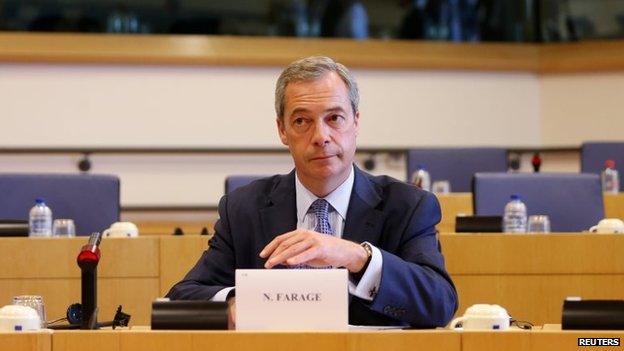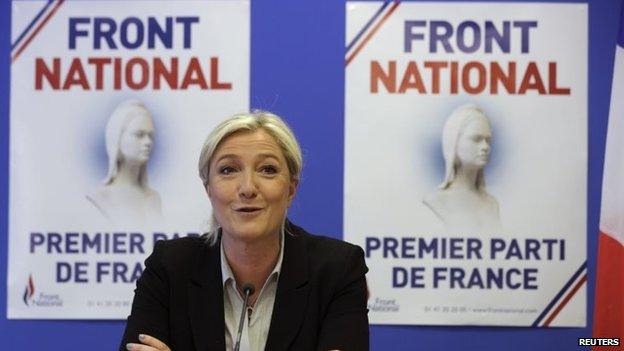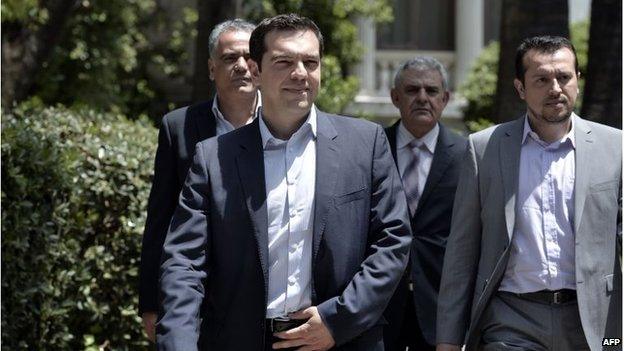Cameron and Hollande urge EU reform at Brussels summit
- Published
David Cameron: "The EU cannot shrug off these results"
Britain and France have called for EU reforms, as leaders arrive for a summit in Brussels after elections which gave a boost to Eurosceptic parties.
President Francois Hollande asked Europe to "pay attention" to the events in France, where his Socialist party lost to the far-right National Front.
Mr Cameron, whose Conservatives lost to the UK Independence Party (UKIP), said Brussels was "too big, too bossy".
Populist and far-right parties across the EU also saw a surge in support.
The votes have strengthened the anti-EU position in the European Parliament, but pro-European parties still won most votes overall.

Vote 2014


Tuesday's informal summit is the first opportunity for leaders of all 28 member states to discuss the way forward after last week's elections.
Many of those there will have faced a tough few days at home, correspondents say.
Mr Hollande has described his domestic results as "painful".
The National Front - which Germany's finance minister, the pro-EU Wolfgang Schaeuble, described as "fascist" - stormed to victory with a preliminary 25% of the vote, pushing Mr Hollande's Socialists into third place.
National Front President Marine Le Pen said she would use her electoral mandate to "defend France" and fight "crazy measures like votes for immigrants".
"Yes, there is a problem," Mr Hollande said on arriving in Brussels. "But it's not only a problem for France and to which France must find an answer... It's also a problem for Europe."

Matthew Price, BBC News, Brussels
The BBC's Matthew Price looks at the challenges facing the EU
Europe has not "voted against the EU". The vast majority of those who bothered to cast a ballot did so for parties that are pro-EU.
Yes, the focus is understandably on France and the UK, with Denmark, Greece, and others also giving Euro-enthusiasts cause for concern.
However in many countries mainstream parties dominated - in Germany, Italy, Poland - where it was felt a growing Eurosceptic movement could break through - in the Netherlands and elsewhere.

Mr Hollande has said he will use the summit to "reaffirm that the priority is growth, jobs and investment".

Nigel Farage's Eurosceptic party UKIP got the most votes of any party in the UK

Far right leader Marine Le Pen said France could not ignore the voices of her National Front supporters

Alexis Tsipras, head of Greece's radical left opposition Syriza, called for early elections after its gains
Mr Cameron said the EU "cannot just shrug off these results and carry on as before".
"We need change. We need an approach that recognises that Europe should concentrate on what matters, on growth and jobs, and not try to do so much."
UKIP took 27% of the vote in the UK, the first time in a century that a party other than the Conservatives or Labour has won a UK election.
'Workable majority'
Despite the unprecedented Eurosceptic gains across the Union, the pro-EU bloc has retained a comfortable majority in the parliament.
The centre-right European People's Party appears to have won 213 out of the 751 seats, with 28.36% across the bloc, according to estimated results issued by the European Parliament, external.
The Socialist alliance has 25.3% of the vote, the Liberals 9% and the Greens 7%.
The Eurosceptic Europe of Freedom and Democracy group appeared to have about 5%, with its anti-EU voice boosted by a number of independent MEPs.
Turnout across Europe is estimated at 43.1%, the first time it has not fallen since the previous election.
The parliament's powers have expanded since the last election in 2009, and it is hoping to have a decisive say in who gets the EU's top job, president of the European Commission.
You can follow full coverage with all the latest updates at bbc.co.uk/vote2014.